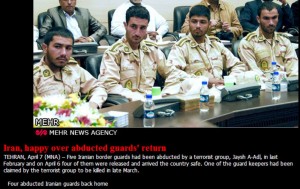Iran Claims Arrest of 20 Jeish Al-Adl Members
Iran announced today that twenty members of Jeish Al-Adl have been arrested. The announcement, however, did not say when or where the arrests were made. Further, although the Fars News article announcing the arrests mentions the IRGC several times, it does not indicate whether they or Iranian border guards made the arrests. As you will recall, Jeish Al-Adl has been active in the Sistan and Bolochistan province of Iran and its border with the Balochistan province of Pakistan. Most significantly, an attack they carried out in October, 2013 killed 14 Iranian border guards and exacerbated ongoing border skirmishes between the two countries. Later, Jeish Al-Adl captured five borders guards from Iran and took them to Pakistan. After killing one, the group eventually released the other four.
From the Fars News article:
Iran announced on Tuesday that it has arrested 20 members of the al-Qaeda-affiliated Jeish al-Adl terrorist group.
“20 members of the Jeish al-Adl terrorist grouplet have been arrested in their hideout,” Iranian Deputy Interior Minister Hossein Ali Amiri told reporters in Tehran today.
Amiri, who is also the spokesman of the Interior Ministry, declined to provide any further detail about the exact location or date of the arrests.
Interestingly, after linking the group with al Qaeda in the opening of the article, Fars News goes on to link Sunni Wahhabism at its conclusion:
The terrorists who have reportedly been members of the outlawed Jeish Al-Adl radical Sunni Wahhabi movement fled into Pakistan after the operation in Iran’s Southeastern Sistan and Balouchestan province.
Because the announcement does not give a date for the arrests (perhaps this note from January 5 is a clue, although it too is nebulous on arrest dates), it seems reasonable to wonder about the timing of announcing them now. The dig at Wahhabism at the end of the article might be seen as a warning to Saudi Arabia not to increase support for exported extremism as a new king takes over.
However, the announcement also comes on the heels of the largest electricity outage that Pakistan has ever experienced. The blackout was triggered by an attack on transmission lines that has been claimed by the Baloch Republican Army, although the poor state of Pakistan’s power grid contributed greatly to the severity of the blackout. This group is distinct from Jeish Al-Adl is one of many groups fighting for an independent Balochistan. The attack on the power lines was about 250 miles from the border with Iran, if I am interpreting the reports and maps properly.
By mentioning the arrests now, Iran is increasing attention on the poor state of security in Pakistan’s Balochistan province. Two days after the attack, repairs to the power line have not yet started due to poor security in the region. And now Iran announces that over at the border, a large group of terrorists, presumably using Pakistan as a sometimes harbor, has also been arrested.
I’ll keep an eye out for more developments along this very interesting stretch of border.

